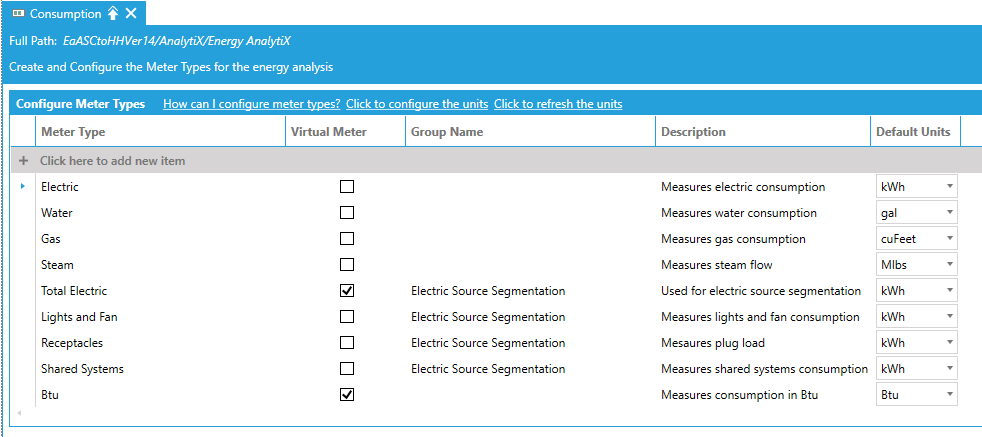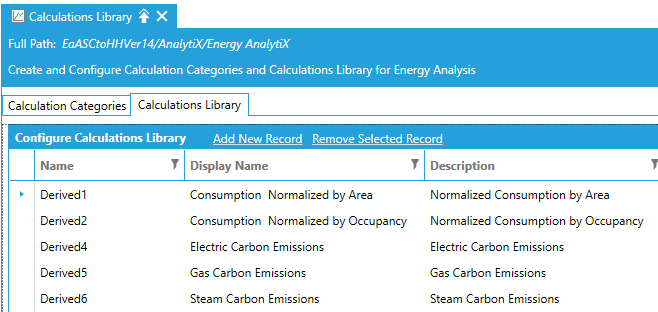|
|
The features on this page require a GENESIS64 Advanced license and are not available with GENESIS64 Basic SCADA . |
|
|
The features on this page require a GENESIS64 Advanced license and are not available with GENESIS64 Basic SCADA . |
Energy Assets are typically assets on which energy calculations will be assigned based on energy meter consumption values or other regular energy assets consumption. These are typically assets like building, room, manufacturing cell, etc.
An energy asset aggregates and rollups consumption data from meters or other energy assets.
There are two types of regular energy assets:
Non-Rollup: Typically located right above energy meters and they calculate energy consumption using only energy meter consumption data.
Rollup: Typically, they are higher level assets and they are used to rollup (summarize) energy consumption using the energy consumption of their children assets (for example a building asset would rollup the consumption of all its floors and a floor would rollup the consumption of all its rooms).
Energy AnalytiX Assets in Workbench

Meter types are configured at the Energy AnalytiX provider node in Workbench. Their primary role is to:
Enable energy data analysis per meter type (such as electric, gas etc.)
Facilitate the configuration of energy calculations
Enable advanced energy scenarios such as
Energy unit conversions
Energy source allocation
Energy source segmentation
Advanced energy calculation implementation using variables from various meter types
Meter Types in Energy AnalytiX

Energy AnalytiX supports two options for meter types
Non-virtual
Typically utilized in simple energy applications for energy consumption analysis based on energy source (electric, gas, water, steam etc.).
Energy calculations related to this option of meter types are configured only for variables associated with the specific meter type.
Virtual
Typically utilized in advanced energy applications which will need advanced support for configuring energy calculations which include consumption variables from various meter types.
Energy calculations related to this option of meter types are configured for variables associated with any meter type.
With respect to the role of virtual meter types as far as energy calculations are concerned will take into consideration a few scenarios, such as:
Meter type of calculation is NOT a virtual meter type...
If there is no meter type group defined:
Only meter consumption tags for which their meter types match the meter type of the calculation will be considered.
There is a meter type group defined:
Only meter consumption tags for which their meter type group name matches the group name meter type of the calculation will be considered.
Meter type of calculation IS a virtual meter type...
If there is no meter type group defined:
All meter consumption tags for any meter type will be considered.
There is a meter type group defined:
All meter consumption tags for any meter type will be considered for which their meter type group name matches the meter type group name of the calculation.
When a virtual meter type is defined, the user can configure complex energy calculations for a variety of purposes. For example, consider the following scenario where we would like to add an energy calculation for kWH / gallon of water. The required steps would be:
Add an electric meter type (for kWH).
Add an energy meter for electric consumption of electric meter type.
Add a water meter type (for gallons of water).
Add an energy meter for water consumption of water meter type.
Add consumption calculation for electric meter type.
Add consumption calculation for water meter type.
Add a virtual meter type for say ElectricPerGallonOfWater
Add a consumption calculation for ElectricPerGallonOfWater meter type defined as {{Electric Consumption}} / {{Water Consumption}}.
A more advanced scenario of electric source segmentation is available in the installed energy-related equipment classes.
Advanced Scenario of Electric Source Segmentation

Energy AnalytiX supports multiple types of energy calculations: standard, derived, carbon and cost.
Standard consumption calculations are based on meter data variables.
Derived calculations are based on standard calculation data variables and energy variables values. They are used for normalized consumption values, defining custom cost calculations or in any custom calculation that an end user would like to define.
Carbon calculations are a special category of derived calculations targeting carbon emissions.
Cost calculations require no configuration and are built into Energy AnalytiX runtime. The user only needs to enable them.
The Calculations Library is a set of predefined derived energy calculations that are installed with Energy AnalytiX. End users can define more and the Calculation Library enables the definition of the required energy calculations in a template manner in order to accelerate associating the calculations to actual energy assets.
Calculations Library in Workbench

Calculation categories are used to categorize energy calculations data in groups, so that the runtime charts and reports can produce meaningful visualization and reporting results. They are also used in runtime filtering operations.
Energy AnalytiX Calculation Categories in Workbench

For various energy assets at your application, you will be defining the following calculations for each energy asset:
Energy consumption (required)
Energy costs (optional)
Carbon footprint (optional)
Typical energy-related calculations are provided for you by Energy AnalytiX, however others will need to be defined in the library of calculation templates and configured for individual energy assets:
Consumption: Raw consumption is calculated using standard calculations. However, normalized consumption computations use derived calculations that you need to add to the library of calculations.
Cost: An energy asset's energy-related costs are automatically calculated based on the energy asset's consumption and the utility's rate model. Any additional cost computations use derived calculations that you need to add to the library of calculations.
Carbon: All carbon emissions computations use derived calculations that you need to add to the library of calculations.
See Also: